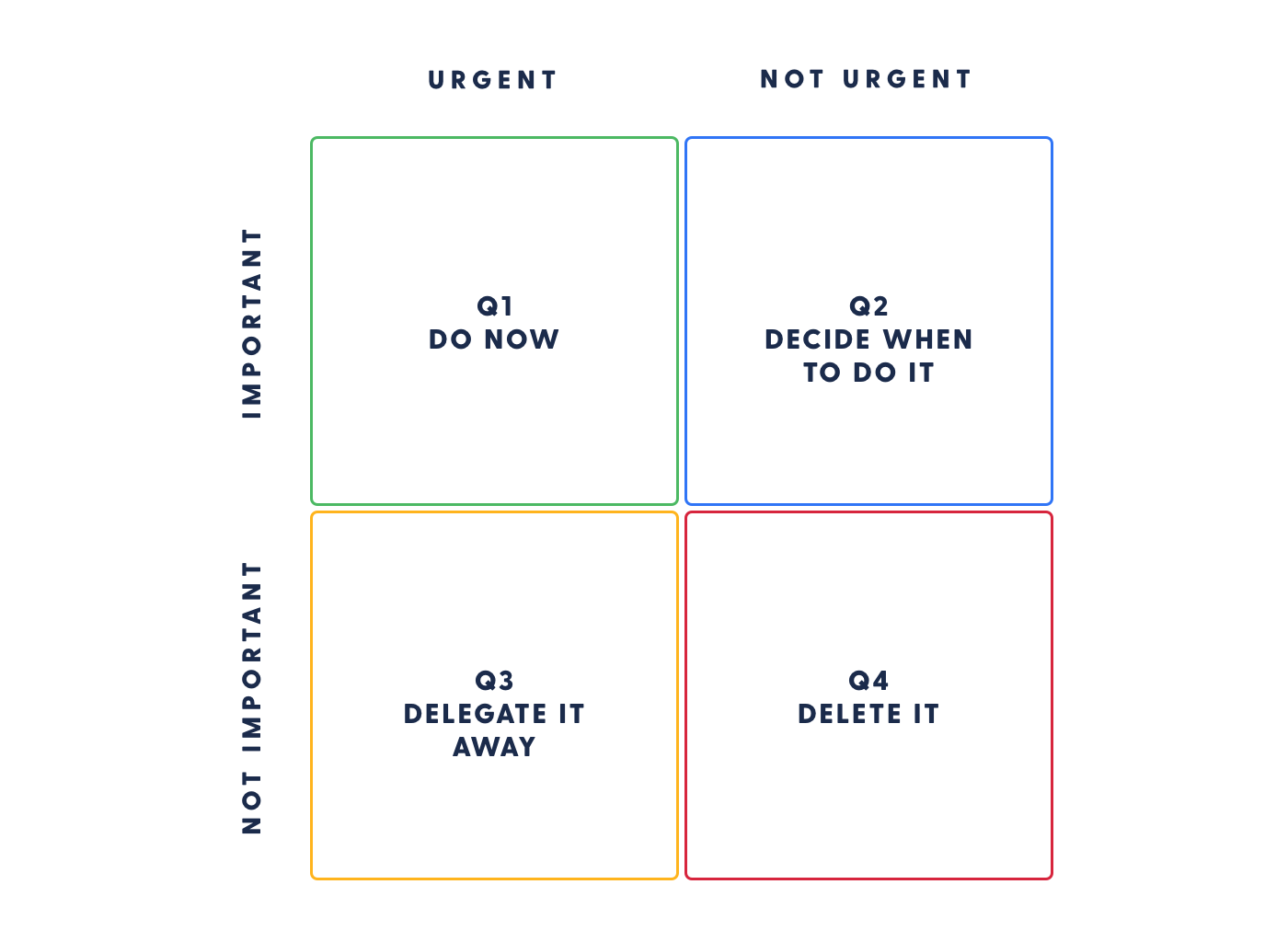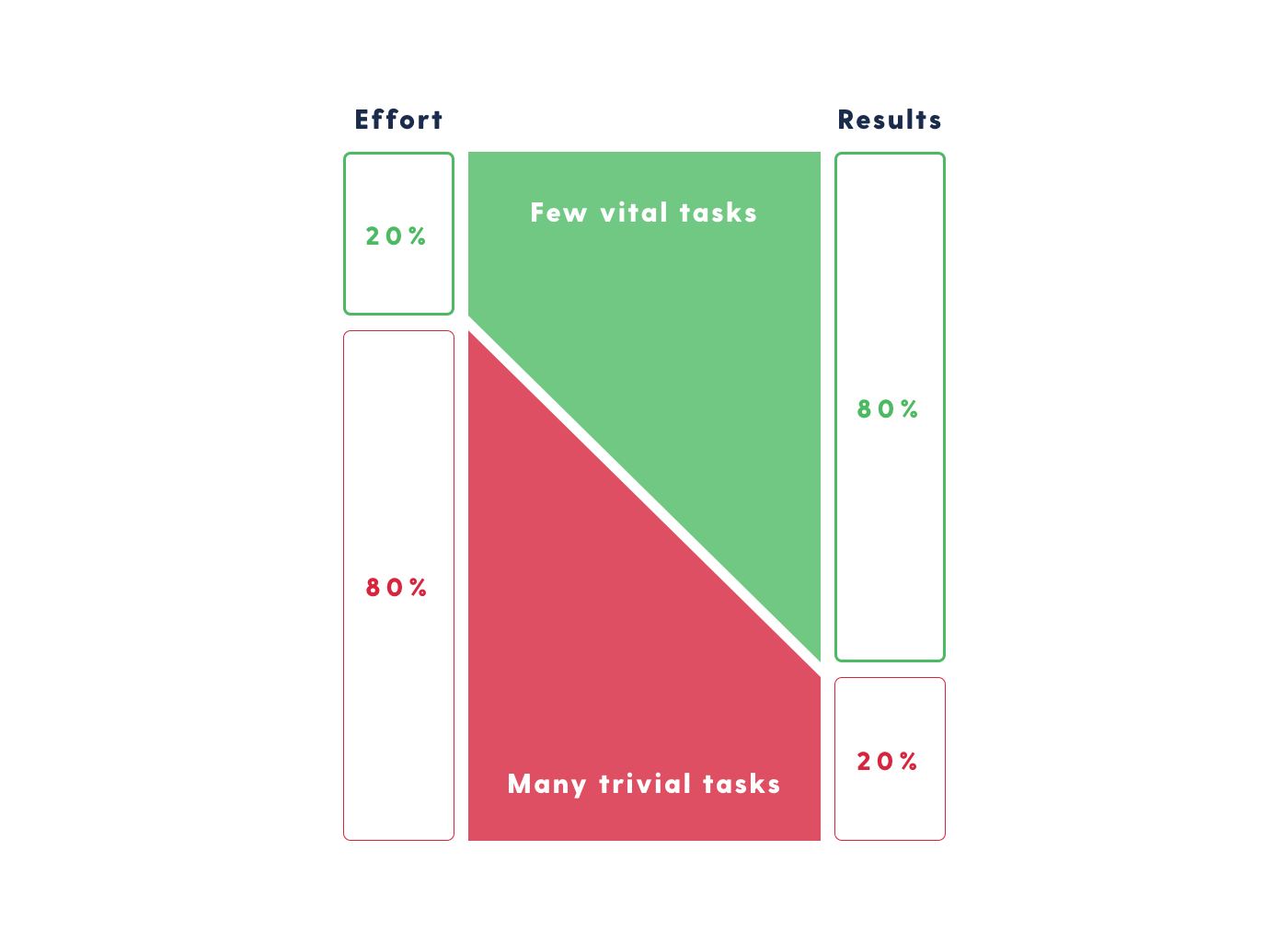Triple your productivity or 8 time management strategies

Panic and giving up. It sometimes happens when you’re faced with a mile-long to-do list and deadlines are looming around the corner. The clock is ticking, days are racing by and piles of work just keep getting bigger and bigger.
But the devil is not so black as he is painted. Turns out, we can let the clock tick by our own rules. The key to achieving your goals and reducing stress is time management.
Here are 8 quick, easy and painless ways to work smarter:
1. Plan your day
Wise man once said: those who can control time, can control themselves. Which means that the best way to start your day is with a cup of tea or coffee in one hand and a planner in the other.
Whether to write down a list in your planner, make notes on your computer or use planning apps, such as
...is really up to you.
Setting priorities
There are as many planning tips and tricks as there are people, however, they all have one thing in common — setting priorities. One of the easiest time management methods is to list priorities based on the deadline, benefit or trouble that you may get in if you fail to do your work on time.
The Eisenhower method
You can also use the Eisenhower method: determine how urgent and important are your tasks and then group them in four categories:
- urgent and important
- important but not urgent
- urgent but not important
- little things (neither urgent nor important)

After that, all that’s left to do is to roll up your sleeves and get busy. Do the important and urgent tasks immediately and the others afterwards.
ABC method
You can also try the 1-2-3/ABC method. Group your tasks based on their consequences, e.g., contractual penalty, financial loss or reputational damage, and then do them one by one triumphantly crossing them out from your to-do list.
80/20 rule
Some people plan their work successfully applying the 80/20 rule. Perhaps, it’ll be useful for you, too. This is how it works: when planning your work, keep in mind that 80 % of the result or benefit can be achieved by spending only 20 % of your time.
You need to be smart about planning your work. Group your tasks based on the principle of which will give you the biggest victory, benefit or prize.
The bigger the prize, the more important the task is. This way, relatively little effort will bring you great achievement. All you have to do is work smarter not harder: you need to understand which activity will help your business to reap the greatest benefits and then pay undivided attention to the most important of all the tasks. In other words — implement 80/20 rule in your life.

2. Break-down of larger tasks
You have assessed the urgency of the tasks and made your to-do list. So, what to do next? Keeping it short and simple — break down larger tasks in smaller chunks. A house is built laying brick by brick, likewise even the largest and scariest tasks can be done if they are split into smaller stages.
Something that could help you do this is Tomato timer.
All you have to do is take a deep breath, press the Start button and devote all your attention to one small stage of the task and then the next one, and then the next one... Soon enough you’ll see the finish line.
3. Focus your attention!
What is the one thing that separates 9 out of 10 people who reach their goals from those who stop halfway? Talent? No! Their ability to reach the finish line.
E-mails, meetings, documents, phone calls, internet — all of this is what we call information chaos. People say that the most in-demand skill of 21st century is multitasking.
Maybe it’s true, maybe it isn’t. Either way, you’ll be able to achieve more if you group similar tasks together and pay undivided attention to them.
For example,
- work on replying to e-mails and customers
- work with documents
- research new products of competitors
- make 10 calls to vendors
You can and you should group these tasks together. It’ll help you avoid using up all your energy on and divert attention to little things.
You can also group your tasks by topics, for example:
- Processing of customer requests
- Accounting
- Marketing
- Product development and growth
4. Abracadabra, there is your extra time!
Let’s face it. At some point, we all have wished we could add extra hours or even days in our week. How do we find extra time when we think that we might have spent it all already?
First, win the battle of useless meetings. Meetings are like mythical creatures that hide behind the preconception of productivity, but if managed poorly they just turn into useless time thieves filled with discussions about the latest season of Games of Thrones and what everyone did on their holiday. Decide on the length of the meeting, make a list of issues that need to be discussed during the meeting and determine the desired outcome. Another good strategy is to hold the meetings on specific a day and time of each month which will help you and your colleagues to always come prepared.
Second — catch the time thieves. All of us have habits that steal big chunks of our time without us even noticing it. It’s important to understand what’s your bad habit. All you need to do is spend one day at work with a notebook next to you and soon you’ll see which of the most common habits is yours. Internet, longs chats with colleagues, phone calls with mum — these are only few of the most popular ones. This is how a work day can end faster than somebody saying “Scissors sizzle, thistles sizzle”. But the rule’s very simple — first work, then fun.
Third — fill your “free” time. Traffic jams, doctor’s waiting room, delayed meetings, endless queues at the airport. All of these situations create time pockets that you can put to good use. Either by checking your e-mail, reading latest articles on your industry, listening to an audiobook or coming up with new business ideas.
In addition, use these little tricks that will also save you some time — make automated payments wherever possible, create FAQs on your company’s website, pre-schedule content for your social media posts.
5. Del-e-gate
Delegating is a skill that requires practice. You need to be able to trust your colleagues and employees and see who can do a certain task the best and in most efficiently.
The ability to delegate will help you do what is important without spending your energy on the little tasks which sometimes can be insignificant, yet would otherwise slow you down in reaching the bigger goal. At the same time, task delegation to you colleagues will enable you to test their skills in practice, establish closer team relationship and make every one of them feel useful, valued and trustworthy.
6. The big goal
The big goal. Three word that sound so sweet, yet a little bit bitter. It takes sweat and sometimes also tears to climb to the top but the victorious feeling you get when it’s finally been reached is unparalleled. When it comes to the big goal, everything’s quite simple. It’s the guiding principle and the foundation for your strategic time management. No matter how big, small or even tiny is the action, every single one of them should be aimed at achieving the big goal. Yes, the big goal can feel like a bird who sometimes gets so close that it is within hand’s reach, while sometimes it flies further away. However, you need to remember that big things have small beginnings and every little task is like an acorn from which a mighty oak (your big goal) will grow. Step-by-step strategic time management will lead you to the result you desire, whether it be doubling your turnover, increasing the number of visitors or developing an innovative product.
7. Victories — BIG and small
Victories must be celebrated. Always. There are big victories — signing big contracts, getting a promotion, creating innovative products or getting international recognition. And there are also smaller ones — solving technical issues, calming down an angry customer or simply reaching the finish line of a hard work week. All of these moments are worth celebrating and cherishing. Give yourself and your colleagues a pat on a back, say words of appreciation and smile.
It’s no secret that all the tiny but successful steps will lead you to something big. Don't forget it and always recognise the hard work of yourself and others as you make your way towards your biggest dreams.
8. Art of balance
Remember that every month there’ll be at least one day when it seems that everything goes wrong. You can't seem to get the tasks done and your time management skills are failing you miserably. It happens. At that point, what you need is finding balance. We are our own biggest and most important resource to be able to live and work. We tend to forget it while being caught up in the rat race, thinking that burnout is lack of creativity and wearing ourselves down to the breaking point. Empty batteries are hard to charge which is why we need to act pro-actively. Some find strength in their work, others in swimming, running, meditating or watching their favourite TV shows with their loved ones. There are many things to choose from and each of us can pick whatever we prefer.
You need to find your source of energy and recharge to reach the highest peaks, think greater thoughts, come up with more creative ideas, better manage your time and turn your dreams into reality.
What are your time management strategies? Comment down below what’s the best way to manage your time and reach your goals.
